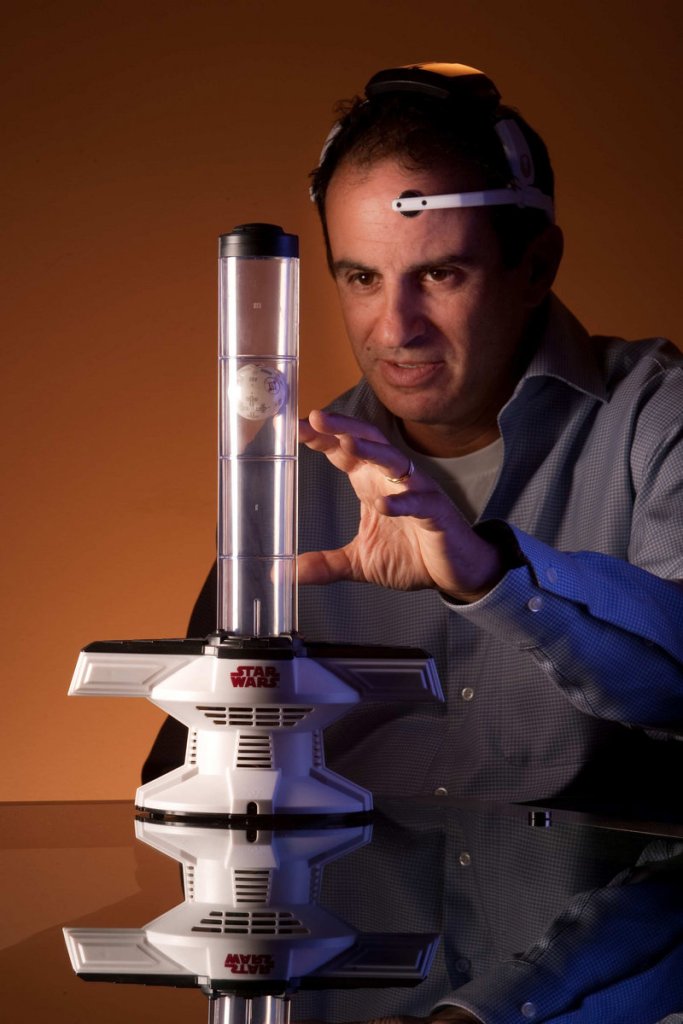Charlatans and con artists have laid claim to its power for centuries. In science fiction, Jedi knights call it “the Force,” and the mind-bending X-Men (and Women) are old hats at it.
Telekinesis. Harnessing the mind to control your surroundings. It is the stuff of fantasy.
Now, that fantasy is crystallizing into reality.
An array of new consumer products — including electronics, toys, medical devices and smart-phone apps — are designed to be operated by mental power.
Two games, which flew off the shelves last Christmas season, are based on technology that reads brain waves, similar to electroencephalograph (or EEG) machines used to diagnose brain disorders.
Both games — Mattel’s $80 Mindflex and the $130 Force Trainer by Uncle Milton Industries — work by having players wear headsets that monitor the electrical waves coming from their brains. simply concentrating, or relaxing, players can control the operation of fans, which then push small balls through obstacle courses.
Leslee Lukosh didn’t believe it, until she saw it. The 47-year-old art teacher from Portland, Ore., said her two sons, ages 10 and 12, pressed her to buy the Mindflex game.
“I thought, ‘No way is that going to work,’ ” Lukosh said. ” ‘It’s ridiculous!’ “
The game soon proved addictive. “My boys couldn’t stop playing with it,” Lukosh said. “My husband couldn’t believe it. And then none of us could stop playing it.”
Stanley Yang isn’t surprised.
“That’s everyone’s initial reaction to the technology: It doesn’t work. It can’t work. Telekinesis is just something in the movies,” said Yang, chief executive of NeuroSky, the San Jose, Calif., company that provides the operating system for both the Mattel and Uncle Milton games. “And telekinesis in its pure form is really impossible. But this technology is as close as you will get.”
Indeed, the ability to move objects with mind power alone — as in Stephen King’s “Carrie” and countless other works of fiction — is still fantasy.
“It may be amusing as a consumer device,” said Gerald Loeb, a professor of biomedical engineering at the University of Southern California. “You could compare it to the biofeedback fad 30 years ago. It’s getting its 15 minutes of fame, but eventually people will get more realistic about what its limitations are.”
For now, consumer product companies see opportunity.
Honda Motor Co. is among the automakers spending research dollars on mind-control features.
“If you have a lot of groceries, wouldn’t it be convenient if you could think, ‘Open up trunk,’ and the trunk would open?” spokesman David Iida said. “These are all possible applications to everyday life.”
Last year, Toyota Motor Corp. crafted a wheelchair that operates by measuring brain waves, using its own proprietary technology. Think left or right, and the chair will obey — although to stop, users must puff their cheeks.
The technology looks especially promising for improving prosthetic limbs. Just last month, the Defense Advanced Research Projects Agency, the research arm of the Defense Department, awarded up to $34.5 million to John Hopkins University in Baltimore to begin testing mind-controlled prosthetics on quadriplegic patients.
“Just imagine a wheelchair with a couple of arms attached to the sides,” said project manager Michael McLoughlin. The goal is soon to refine and produce artificial limbs guided by brain commands that are precise enough to button shirts and perform complicated household chores, he said.
Sega Toys Co., part of gaming giant Sega Sammy Holdings, and electronics heavyweight Toshiba Corp. are both partnering with NeuroSky to create games with a telekinetic element. “Final Fantasy” developer Square Enix Holdings Co. showed off “Judecca” in 2008, a demo game where players must meditate to see and slay zombie hordes.
Next year, Iceland-based game developer Mind Games will roll out “Tug of Mind,” the Apple App Store’s first mind-controlled game, which also works with a NeuroSky headset.
The game tests the player’s ability to stay cool under pressure. After uploading a headshot — of a boss or an ex-boyfriend, say — the photo is turned into an angry avatar who screams pre-recorded insults (or the annoying message of your choice). The avatar is soothed if the player remains calm; do so long enough, it eventually smiles and the game is won.
“The aim is to make the kind of games with this tech that you couldn’t make any other way,” said Mind Games co-founder Deepa Iyengar.
Send questions/comments to the editors.



Success. Please wait for the page to reload. If the page does not reload within 5 seconds, please refresh the page.
Enter your email and password to access comments.
Hi, to comment on stories you must . This profile is in addition to your subscription and website login.
Already have a commenting profile? .
Invalid username/password.
Please check your email to confirm and complete your registration.
Only subscribers are eligible to post comments. Please subscribe or login first for digital access. Here’s why.
Use the form below to reset your password. When you've submitted your account email, we will send an email with a reset code.